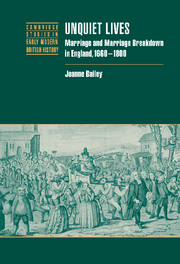Book contents
- Frontmatter
- Contents
- Acknowledgements
- List of abbreviations and conventions
- 1 Introduction: reassessing marriage
- 2 ‘To have and to hold’: analysing married life
- 3 ‘For better, for worse’: resolving marital difficulties
- 4 ‘An honourable estate’: marital roles in the household
- 5 ‘With all my worldly goods I thee endow’: spouses' contributions and possessions within marriage
- 6 ‘Wilt thou obey him, and serve him’: the marital power balance
- 7 ‘Forsaking all other’: marital chastity
- 8 ‘Till death us do part’: life after a failed marriage
- 9 ‘Mutual society, help and comfort’: conclusion
- Appendices
- Bibliography
- Index
- Titles in the series
3 - ‘For better, for worse’: resolving marital difficulties
Published online by Cambridge University Press: 27 July 2009
- Frontmatter
- Contents
- Acknowledgements
- List of abbreviations and conventions
- 1 Introduction: reassessing marriage
- 2 ‘To have and to hold’: analysing married life
- 3 ‘For better, for worse’: resolving marital difficulties
- 4 ‘An honourable estate’: marital roles in the household
- 5 ‘With all my worldly goods I thee endow’: spouses' contributions and possessions within marriage
- 6 ‘Wilt thou obey him, and serve him’: the marital power balance
- 7 ‘Forsaking all other’: marital chastity
- 8 ‘Till death us do part’: life after a failed marriage
- 9 ‘Mutual society, help and comfort’: conclusion
- Appendices
- Bibliography
- Index
- Titles in the series
Summary
DEFINING MARITAL DIFFICULTIES
‘Marital difficulties’ is a term applied in this study to describe collectively any conflict between wives and husbands. It encompasses isolated incidents and lengthy periods, whether they resulted in the continuance or restoration of cohabitation, an agreed separation, or went unresolved. It also acts as a simplified term for the range of specific expressions employed by people in the long eighteenth century, which covered the spectrum from disagreements between partners to the irrevocable collapse of a relationship. When contemporaries discussed the former, they usually referred to spouses ‘having some words’, or ‘quarrels’, ‘contests’, ‘disputes’ or ‘misery’. More particularly, wives and husbands ‘ill-treated’ their spouses, behaved ‘unbecomingly’, or in men's cases ‘barbarously’. Breakdown was carefully divided into separation and desertion. Accounts of separation used this term, though it was more commonly stated that a couple had ‘parted’, followed by a phrase that showed it was a mutual, consensual decision to live apart. Desertion and elopement, however, were unilateral decisions by one partner to leave. Such spouses were described as ‘leaving’, ‘absconding’ or ‘absenting’ and ‘withdrawing’ themselves. Gender-specific terms were applied, so that it was mostly wives who eloped and men who either ‘ran-away’ or ‘turned-out’ wives and children.
People in the long eighteenth century did not think of these types of marital difficulties as separate phenomena, but stages of the same process that could occur at any time in the life of the marriage. This makes historians' distinctions between marital conflict, breakdown, separation and divorce somewhat artificial.
- Type
- Chapter
- Information
- Unquiet LivesMarriage and Marriage Breakdown in England, 1660–1800, pp. 30 - 60Publisher: Cambridge University PressPrint publication year: 2003



